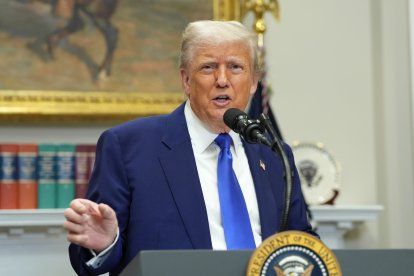Federal court allows Trump to continue his broader tariffs
So far, the appeals court has not determined whether the tariffs are legal under the International Emergency Economic Powers Act (IEEPA), which Trump invoked to justify them.

Donald Trump at the White House (File)
The Washington-based U.S. Court of Appeals for the Federal Circuit on Tuesday allowed the U.S. president's broader tariffs Donald Trump continue in force while reviewing a previous lower court decision that suspended them after finding that the Republican leader had exceeded his authority in imposing them. As explained The Wall Street Journal, the decision means that the U.S. president willwill be able to continue to apply (for now) his "Liberalization Day" tariffson imports coming from a good portion of the country's trading partners, as well as another set of tariffs that were imposed on Mexico, Canada and China.
So far, the appeals court has not determined whether the tariffs are legal under the International Emergency Economic Powers Act (IEEPA), which Trump invoked to justify them. However, it did decide to keep them activewhile the entire judicial processis resolved. The Federal Circuit detailed in a statement that the litigation raises different issues of "exceptional importance" that justify the move to have members of the court hear the appeal instead of remanding it to a three-judge panel. The hearings were officially scheduled for July 31. Also,the ruling did not affect other tariffs that were established under more traditional legal authority, including duties on aluminum and steel imports.
Against illegal fentanyl trafficking
On several occasions, the Republican leader has argued that the tariffs he imposed in February against Mexico, Canada and China were nothing more than a measure to combat illegal fentanyl trafficking across national borders, an accusation that the three countries have repeatedly denied. On the other hand, Trump has also assured that the generalized tariffs imposed on all of the country's trading partners in April were a measure against the U.S. trade deficit.
Similarly, the Republican leader has claimedhe has broad authority to be able to impose the tariffs against other nations around the world under IEEPA. Said law, which was passed in the year 1977, has been used throughout history by different U.S. presidents to impose sanctions or simply freeze the assets of countries that at their certain times are considered enemies of the United States. Despite this, Trump is the first president in the country's history to use this law to impose tariffs.
























